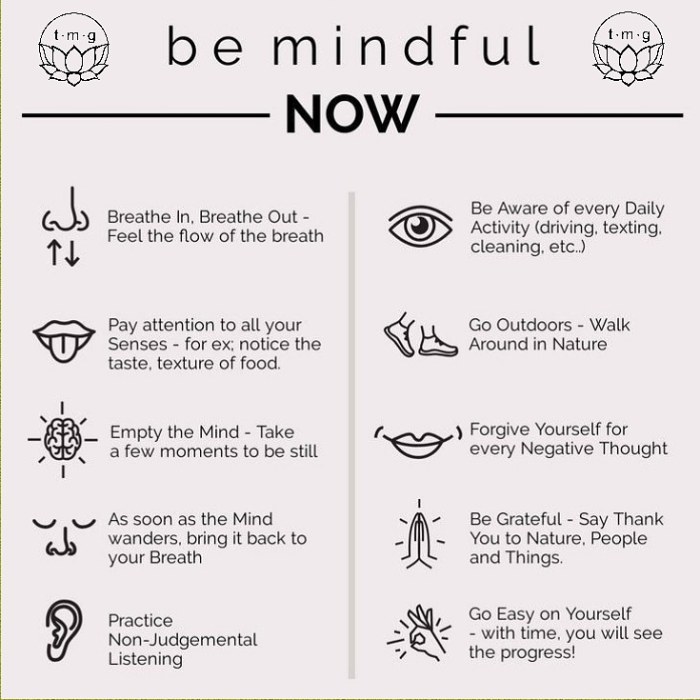Kicking off with Mindfulness Exercises, this opening paragraph is designed to captivate and engage the readers, setting the tone american high school hip style that unfolds with each word. Mindfulness Exercises are all about boosting your mental game and overall well-being. From reducing stress to improving focus, these exercises pack a punch in helping you navigate the chaos of everyday life.
Whether you’re a newbie or a seasoned pro, the world of mindfulness exercises offers a variety of techniques to elevate your mindfulness game. Let’s dive into the different types, how to incorporate them into your daily grind, and their impact on specific situations. Get ready to level up your mindfulness skills!
Benefits of Mindfulness Exercises

Mindfulness exercises have numerous benefits for both mental and physical well-being. These practices can significantly improve mental health by promoting self-awareness, emotional regulation, and overall psychological resilience.
Improved Mental Well-being
- Enhanced self-awareness and emotional regulation
- Reduced rumination and negative thinking patterns
- Increased overall psychological resilience
- Improved mood and overall well-being
Physical Health Benefits
- Reduced blood pressure and heart rate
- Improved quality of sleep
- Boosted immune system function
- Decreased inflammation in the body
Stress and Anxiety Reduction
- Lowered levels of cortisol, the stress hormone
- Decreased symptoms of anxiety and depression
- Enhanced ability to cope with stressful situations
- Improved overall sense of calm and relaxation
Enhanced Focus and Concentration
- Improved cognitive functions and decision-making abilities
- Increased attention span and ability to concentrate
- Enhanced memory retention and recall
- Boosted creativity and problem-solving skills
Types of Mindfulness Exercises

When it comes to mindfulness exercises, there are various techniques that can help individuals cultivate awareness and presence in their daily lives. These exercises can range from simple practices like mindful breathing to more complex activities such as yoga or tai chi. Here, we’ll explore some common types of mindfulness exercises and how they can be incorporated into daily routines for beginners.
Mindful Breathing
- Focus on your breath, noticing the sensation as you inhale and exhale.
- Use your breath as an anchor to bring your attention back to the present moment whenever your mind starts to wander.
- Practice deep breathing exercises to help relax your body and mind.
Body Scan
- Start at your toes and work your way up, paying attention to each part of your body.
- Notice any sensations or feelings without judgment, simply observing and letting go.
- This practice can help you become more aware of physical tension and release it through mindfulness.
Loving-Kindness Meditation
- Focus on sending love and kindness to yourself, loved ones, and even those you may have difficulties with.
- Practice cultivating compassion and forgiveness through this structured meditation.
- This exercise can help foster a sense of connection and empathy towards others.
Mindfulness Activities
- Engage in activities like yoga, tai chi, or walking meditation to incorporate mindfulness into movement.
- Focus on the sensations in your body as you move, staying present and aware of each moment.
- These practices combine physical and mental awareness for a holistic mindfulness experience.
Incorporating Mindfulness into Daily Routines
- Start with short sessions of mindfulness exercises, gradually increasing the duration as you build your practice.
- Integrate mindfulness into everyday activities like eating, walking, or even washing dishes by staying present and focused.
- Set reminders or create a routine to establish a consistent practice that fits into your schedule.
Choosing the Right Technique
- Experiment with different mindfulness exercises to see which ones resonate with you the most.
- Consider your preferences, lifestyle, and goals to find a technique that suits your needs.
- Remember that mindfulness is a personal journey, so trust your instincts and choose a practice that feels right for you.
Mindfulness in Daily Life
Incorporating mindfulness into our daily activities can have a profound impact on our overall well-being and relationships with others. By being present and engaged in the moment, we can improve our self-awareness, emotional regulation, and interpersonal connections.
Integrating Mindfulness into Everyday Activities
- When eating, focus on the flavors, textures, and sensations of each bite. Avoid distractions like screens or multitasking.
- While walking, pay attention to your surroundings, the feeling of each step, and your breath. Practice walking meditation to stay present.
- During work, take short mindfulness breaks to reset and refocus. Notice your thoughts and emotions without judgment.
Improving Interpersonal Relationships
- By being fully present with others, you can listen more attentively and understand their perspective without jumping to conclusions.
- Practicing empathy and compassion through mindfulness can strengthen your connections and resolve conflicts peacefully.
- Mindful communication involves speaking consciously, choosing words carefully, and being aware of non-verbal cues for effective interaction.
Importance of Being Present
- Being present in the moment allows us to fully experience life as it unfolds, rather than dwelling on the past or worrying about the future.
- Mindfulness helps us appreciate the beauty in simple everyday moments and fosters a sense of gratitude and contentment.
Enhancing Self-Awareness and Emotional Regulation
- Through mindfulness practices, we can develop a deeper understanding of our thoughts, emotions, and behaviors, leading to increased self-awareness.
- By observing our internal experiences without judgment, we can learn to respond to challenges calmly and manage stress more effectively.
Mindfulness Exercises for Specific Situations
When it comes to managing stress at work or in academic settings, mindfulness exercises can be incredibly beneficial in helping you stay grounded and focused. These techniques can also aid in coping with difficult emotions and challenging situations, improve sleep quality, enhance creativity, and sharpen problem-solving skills.
Managing Stress at Work or in Academic Settings, Mindfulness Exercises
One effective mindfulness exercise for managing stress in these environments is deep breathing. Take a few moments to focus on your breath, inhaling deeply through your nose and exhaling slowly through your mouth. This can help calm your mind and reduce feelings of overwhelm.
Coping with Difficult Emotions or Challenging Situations
- Body Scan: Close your eyes and bring your attention to different parts of your body, noticing any tension or discomfort. Take deep breaths and release any physical sensations associated with difficult emotions.
- Loving-Kindness Meditation: Practice sending loving and kind thoughts to yourself and others, fostering a sense of compassion and understanding in challenging situations.
Better Sleep Quality and Relaxation
Progressive Muscle Relaxation: Tense and relax each muscle group in your body, starting from your toes and working your way up. This can help release physical tension and promote relaxation for better sleep.
Enhancing Creativity and Problem-Solving Skills
- Mindful Walking: Take a walk outdoors and pay attention to your surroundings, focusing on each step you take. This can stimulate creativity and clear your mind for better problem-solving.
- Visualization: Close your eyes and imagine a peaceful place or a successful outcome to a problem. This can help expand your thinking and approach challenges with a fresh perspective.